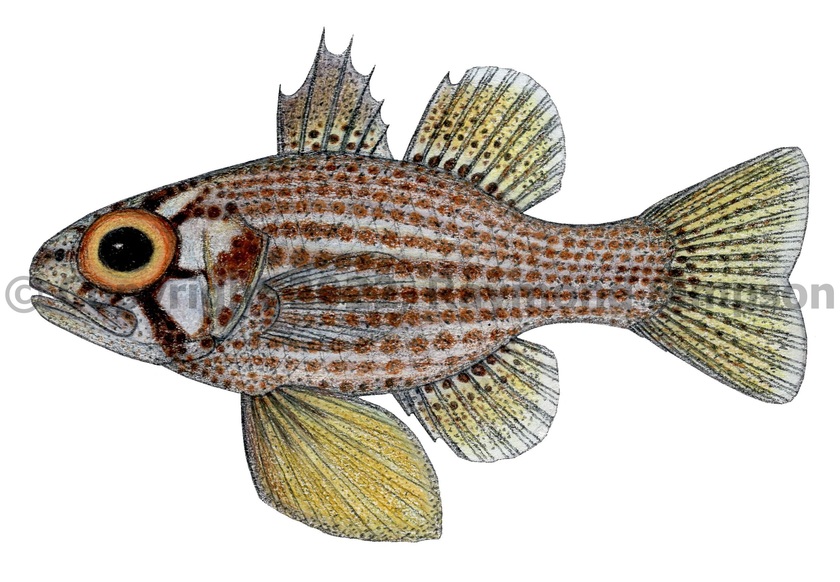
Common Name
Conchfish
Year Described
Cope, 1867
Identification
Dorsal Fin: VI, I-9
Anal Fin: II, 8
Pelvic Fin: I, 5
Pectoral Fin: 14-15
Gill Rakers: 10-12 lower (first arch)
Vertebrae: 10 precaudal, 14-15 caudal
Lateral Line: 23-45 pored scales
A small fish with a fairly robust and moderately compressed body. Eye is large and the snout short. Head profile flat between orbits. Mouth is fairly large and oblique, with the lower jaw slightly protruding. Jaws with bands of villiform teeth. Vomer and palatine with villiform teeth. Preopercular edge with a smooth margin. There are two dorsal fins. The caudal fin is truncate to slightly forked. Pelvic fin very large and expanded: extending to posterior half of anal fin. Body scales cycloid. Predorsal scales absent.
Color
Body pale with large blotched melanphores of bronze or brown and a fine peppering of black melanophores. Sometimes has a pearly sheen. Four black bars radiate from eyes. Fins with a mix of large brown and tiny black melanophores. Front of first dorsal fin black. Pelvic fin brown to bronze. Second dorsal, anal, and caudal fin with translucent margin clear of melanophores. Eye yellow to dark orange.
Size
Maximum size to 72mm TL.
Habitat
Inhabits seagrass beds. Most often found as a commensal inside living conch shells.
Range
S. Florida to Brazil, including the Gulf of Mexico and the Caribbean. Also Bermuda.
References
Gon, O. 2002. Apogonidae (pp 1386-1391). In: Carpenter. 2002. The living marine resources of the Western Central Atlantic. Vol. 3: Bony fishes part 2 (Opistognathidae to Molidae), sea turtles and sea mammals. FAO Species Identification Guides for Fisheries Purposes. American Society of Ichthyologists and Herpetologists Special Publication No. 5.
McEachran, J.D. & J.D. Fechhelm. 2005. Fishes of the Gulf of Mexico. Volume 2: Scorpaeniformes to Tetraodontiformes. University of Texas Press, Austin. i-viii +1-1004.